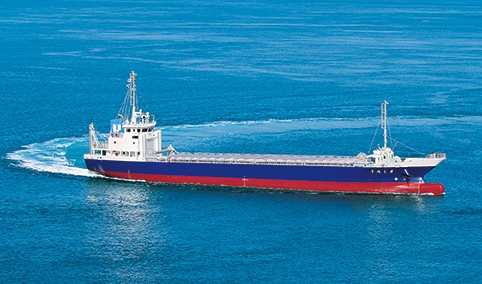Efforts to reduce Scope 3 emissions
Dialogues with raw material suppliers
In order to steadily reduce emissions in Scope 3, Category 1 (products and services purchased), we are engaged in dialogue with major suppliers of iron ore and coking coal.
We interviewed major suppliers who account for more than 70% (based on our purchase volumes in fiscal 2023) of the raw materials purchased (iron ore and coking coal) about their actual Scope 1+2 emissions and their reduction plans. We confirmed through the dialogue that many suppliers are working to achieve net zero Scope 1+2 emissions by 2050.
We will continue to promote dialogues with our suppliers on climate change initiatives and other issues.
Reducing CO2 emissions through more efficient logistics
Logistics sector’s ton–kilometer1 achievements for FY2023
| Transportation quantity:10,000 tons/year | Million ton–kilometers/year | (Reference) g-CO2/ ton–kilometers |
|
|---|---|---|---|
| Ship | 1,656 (57%) |
10,846 (91%) |
39 |
| Railway | 6 (0%) |
36 (0%) |
25 |
| Truck and trailer | 1,342 (43%) |
1,182 (9%) |
211 |
| Total | 3,003 (100%) |
12,064 (100%) |
1 Ton–kilometer: Total sum of the weight of load (ton) transported multiplied by transport distance (km). The reference amounts (in grams) of CO2 emissions per ton–kilometer travelled are the average for all industries (Ministry of Land, Infrastructure, Transport and Tourism)
Nippon Steel’s modal shift ratio
98%
Nippon Steel maintains a high modal shift rate of 98% and works at reducing CO2 emission by raising efficiency in logistics, such as by use of large vessels.
As part of the efforts, we have begun to use “Utashima” — a hybrid–type cargo vessel, equipped with lithium-ion batteries. Our seven cargo vessels were rated the highest in the Coastal Ship Energy Conservation Rating of the Ministry of Land, Infrastructure, Transport and Tourism.
We have also introduced cargo vessels equipped with a hybrid propulsion system consisting of a natural gas-fueled engine and battery, for marine transportation of domestic raw materials.
We will continue to cooperate with relevant ministries, agencies, and organizations to promote use of ships utilizing alternative fuels, in order to reduce greenhouse gas emissions in marine transportation.

Hybrid Cargo Ship “Utashima” equipped with lithium–ion batteries
(Received the Small Cargo Vessel Award of the Ship of the Year 2019)
